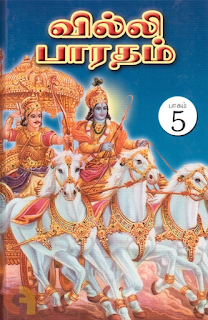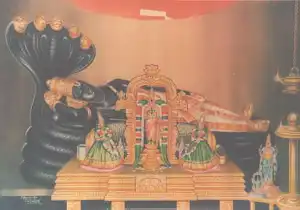Baby Krishna was playing in the courtyard while Mother Yashoda watched over Him.
Suddenly, her baby looked up, and seemed to be bewildered as He looked at the bright moon.
Pointing with His chubby fingers, He asked Mother Yashoda,
“What is that?”
“Oh that is the moon, Kanha! It is God’s toy!”
“I’m only God, I want My toy now! Give me the Moon, Ma!”
“Hush, you naughty boy! You shouldn’t say such things! God will be angry with you!”
He, whom the Vedas proclaim to have the moon as one of His eyes,
He, of whom even all deities are afraid,
That same “baby” Krishna smiled, happy to see His Mother Yashoda held intact in the web of ignorance He had cast on her.
He decided to see how far it would hold.
The baby began stomping His feet and shaking His head, all the time wailing aloud, just like all children do when they turn adamant and want to have their way.
“I want the moon, I want it now, you have to have to give it to me now, Mother!!”
Hearing the childish roaring, gopis young and old began to gather in the courtyard to witness the spectacle.
One elderly gopi quietly brought out a mirror, and thrust it into the hands of the flustered Mother Yashoda.
Relieved at having found a way to pacify her uproarious baby, Yashoda took the mirror, and placed it on the ground.
She beckoned to her child, and said,
“Come here, Kanha, I will give the moon to you!”
He came close to her, even as those mock-tears of frustration were rolling down His eyes.
Unable to bear the sight of her baby crying, her eyes welled up too, with real tears of love and affection. She drew His hand towards the mirror.
“You can have the moon now! Put your hand here, Krishna! See, you can touch the moon! Isn’t he beautiful and so cool to the touch?”
Baby Krishna did just as He was told. He held on to Mother Yashoda with one hand, and with the other, He slowly reached out to touch the moon. Thrilled, He looked back at His mother, and gurgled with laughter like babies of this world do, when they are happy.
The One who thought He had caught Mother Yashoda in the web of His illusion did not realize when and how He Himself got caught in the labyrinth of her love!
An episode with the moon is also described by Periazhwar in his hymns called the Periazhwar Tirumozhi, where he imagines himself to be Mother Yashoda, and describes his enjoyment at the antics of the Lord as his child. The rasa in this composition however is vastly different, as here, the knowledge of the azhwar, who knows that baby Krishna is actually the Lord Himself, seeps into the consciousness of Mother Yashoda.
The moon is making his way across the night sky. Mother Yashoda has finished feeding baby Krishna, and now, she is walking with Him seated on her hip. She shows the Moon to her baby, and talks with the Moon.
“Come quickly, O Moon, my Kannan wants to play with you!”
“Oh, I’ve only just risen, I have a long way to go before I reach your place”
“No, no, you must come quickly. My Kannan has already eaten His food, and is feeling sleepy now. If He has to keep waiting for you, it will be late, and then, the food He has eaten will not get digested properly. So, come right now!”
He who swallows the whole world at the time of pralaya, is going to have indigestion now, by sleeping late, claims Mother Yashoda!
Angry at being taken to task by an ordinary cowherd woman, the Moon scorns Mother Yashoda.
“Oh, I’m busy, I have lots of distance to cover still, so it will be a long time. And besides, what’s so great about your baby? He’s just like any other small kid, hankering for the moon!”
Unable to bear this belittlement of her precious wonder, Mother Yashoda raises her voice.
“You’re ignoring my baby because you think He is “small”? Well, I have a little advice for you, O haughty moon! Go to Mahabali, and ask him about his experience with this “small” one, then you will know who is small, and who is big!”
This reference to how the child Vamana had morphed into the huge Trivikrama when taking boons from Mahabali, shows us how, yet again, although Periazhwar was singing this in the mood of Mother Yashoda, the azhwar frame of mind had slipped in to chastise anyone who failed to see the greatness of His Lord.
On today’s auspicious occasion of Ekadashi, let us thank the Lord for gifting us with these wonderful pastimes He performed, which we can enjoy time and again!











